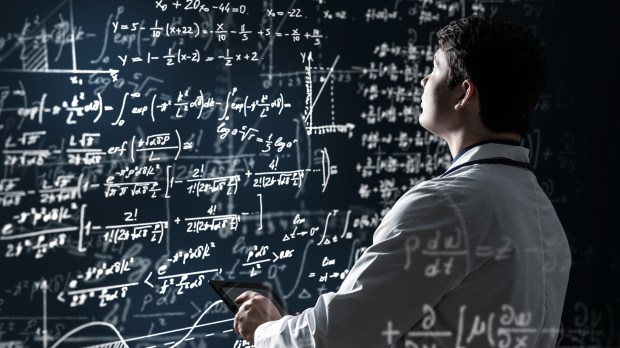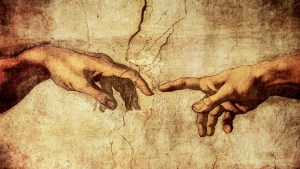Lenten Campaign 2025
This content is free of charge, as are all our articles.
Support us with a donation that is tax-deductible and enable us to continue to reach millions of readers.
In today’s world of modern science, faith is undoubtedly the most misunderstood religious concept. Most secular definitions consider it a blind “leap in the dark” made in the absence of evidence. Such faith is indeed irrational, if not outright superstitious and dangerous. Belief in tooth fairies, reincarnation, or a flat Earth are all either invisible, immeasurable, or contrary to evidence. This is not the Catholic understanding of faith.
A Catholic definition
The Catechism of the Catholic Church (#1814) states: “Faith is the theological virtue by which we believe in God and believe all that he has said and revealed to us.” St Paul further defines faith as “the assurance of things hoped for, the conviction of things not seen.” (Heb 11:1)
In both cases, we see the necessity of reason in bringing us to the threshold of faith. It is this vital collaboration that allows us to believe the words of Jesus and His divine works as recorded in the Gospels, but most important of all — the countless eyewitnesses testifying to His Resurrection.
Evidence — not absolute proof!
It is very important to note that proof, in the absolute sense, is confined to the realm of mathematics. There is no such thing as absolute proof in the real world. Experimental science is a discipline that is not in charge of proving anything beyond all doubt, but simply to put forward theories in light of the best available evidence.
Surprisingly, most of what we deem to “know” is not actually based on direct, but rather — indirect evidence: We believe in what our schoolteachers taught us, the books we read, the internet videos we watch etc. We cannot always see for ourselves, so we instead rely on others for information, and this involves a great deal of trust, or in other words — faith! Everything depends on the strength of the evidence at hand.
The Evidence
Let us then examine some of the evidence for the Christian faith. We must approach this task like a crime scene: What does the evidence point towards?
- The Resurrection
As St Paul outlines in 1 Cor 15:14, “If Christ has not been raised, then our preaching is in vain, and your faith is in vain.” The stakes here are monumental. Either bodily death is not the end, or else we’ve been fooled by some grand conspiracy! Luckily, we have many eyewitness testimonies, including many willing to die for what they saw and knew to be true — the reality of the risen Christ. As Pascal wrote in his Thoughts: “I believe those histories whose witnesses let themselves be slaughtered.” It is very unlikely that dozens of madmen or liars would risk their lives for such a fabrication.
On the more scientific front, we also have the enigmatic Shroud of Turin, with its 500,000+ hours of study — a singular object seemingly hinting at a singular event …
- Scripture
Jesus Christ fulfilled more than 300 prophecies from the Old Testament, including precise details that are all documented in the New Testament.
In the Gospels, we see Jesus preaching a unique message of charity and self-sacrifice, confirming His authority with many signs and wonders. It is often the latter that led unbelievers to convert – their minds were convinced, leading to a change of heart. Let us not assume that these people were fools, for why else were the disciples terrified by the “ghost” they saw walking on water?
- The Saints
“[H]e who believes in me will also do the works that I do; and greater works than these will he do.” (Jn 14:12)
The body of the Church extends throughout history, and it is difficult to ignore the numerous saints who lived exemplary lives of prayer and charity. They obeyed Jesus’ command to preach the kingdom of Heaven and to “[h]eal the sick, raise the dead, cleanse lepers, [and] cast out demons.” (Mt 10:8) Some of the “greater” works reported by the faithful include: bilocation, the reading of souls, decades of food abstinence or stigmata, just to name a few…
What about free will?
All of the above can dispel our doubts regarding the Christian claim, or at the very least intrigue an honest investigator … Yet none of this violates our free will, for our faith in Christ depends on our personal “commitment” to Him, as stated by mathematician-turned-apologist John Lennox. In fact, we all know of those who simply do not want to believe (and do not have to). No amount of evidence will satisfy their prejudice … But for those of us who do allow ourselves to be touched by God’s grace (for faith is nothing short of a gift), then we can make an act of faith that God does indeed exist and that He revealed Himself through His Son to bring us into the fullness of Life.
Faith is transrational
As we have seen, far from being irrational, faith is transrational and goes beyond the realm of reason and experimental science. We must abandon ourselves into the arms of God with trust. Once we have made this choice, we receive the fruits of the Holy Spirit which are: joy, peace, faithfulness, and greater love for those around us.
Let us not forget the words of St. John Paul II who wrote in his encyclical letter Fides et Ratio: “Faith and reason are like two wings on which the human spirit rises to the contemplation of truth.”





